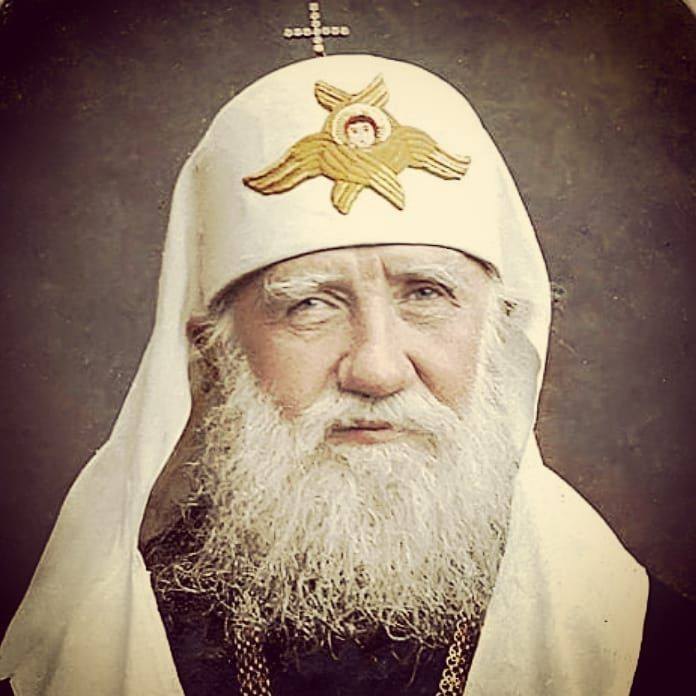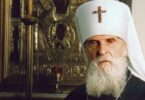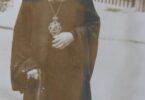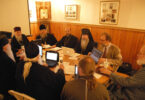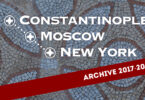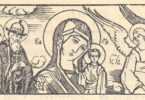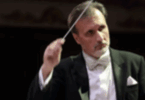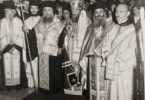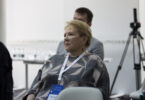This translation was sponsored by the Australian and New Zealand Diocese of the Russian Orthodox Church Outside of Russia.
What does a man harbor within himself? A name is called: it may strike one’s heart, and a spark ignites. The person hastens to meet the call concealed in this name.
Where does this call lead? Our heart has many strings, and the tones of their resonance are multiplied as a man is enriched by culture. There are hosts of names capable of drawing out a sympathetic response from the depths of our consciousness, and sometimes subjugating us to a particular leading light of our age.
Yet who is behind the leading lights of this world, if not the Prince of this world?
Fortunately for man, there are hosts of names that summon him to something else: the names of those who were able to put to nought all the temptations of this age and be entirely lightened by the light of Christ.
Man is rent in twain! For some of us, we find that there is no more attractive force in the names of those great and glorious people who, perhaps, have been themselves saved as from fire by making their way to God, yet whose works, while at times carrying a reflection of heaven, are earth all the same and can only boast an earthly immortality! If only the names of those beatified as earthly angels by the church had not become quite foreign to us! Terrible is the lot of a man in the void of whose soil the sound of a holy name dies out; for such a sound that has come up inadvertently – as it were, inadvertently! – can perform a miracle by instantaneously shifting the arrangement of his soul from darkness to light. Blessed is he who customarily keeps such names in his conscience: like wings, they will carry him through the squares of this world to the Unwaning Light…
To their number is appended, in our eyes, in the process of our own spiritual growth, that name which is celebrated radiantly this year: that of Patriarch Tikhon.
* * *
Quietude and light rest on this Chosen Man of God. Strange to the world, he is close to God and men: it is as such that we see him in his family, at school, in the field of ministry, from his first steps until the end.
The living antiquity of the backwaters of Toropets lent him his first life impressions. The spiritually fragrant age-old Orthodox way of life nourished his soul. Hence its strength, which enabled the boy and youth Vasilii Belavin, while passing through the cycle of theological education, to take all of the good things that it gave him, while passing by all of the dark things that were nesting under its roof and made some more sensitive natures vulnerable to the wiles of this world. Hence, we must think, came that which doubtless would be the firm legacy of the future holy hierarch of this age: living knowledge of the Word of God.
One may know much about it, but only a living knowledge of the Word of God can become a source of grace. It is precisely such knowledge that was inherent to Patriarch Tikhon. He thought and sensed things in terms of the models of the Word of God: it burned and was bright within him. What a great strength this is, which not only has an outward effect but also grants inward power! This is the key to Patriarch Tikhon’s invincibility, devoid as it is of any kind of “heroism”, farfetchedness, grandiloquence. For what does it mean to receive the Word of God in oneself? It means to have a Faith so melded with one’s nature that one’s every move is an action of Faith, and that not in the process of deliberation and extrapolation of a particular case to a general rule, but by the immediate command of one’s heart. This is what it is to be a Christian.
This is how the future Angel of our Church was from his youth. This is how he remained at school. After from the Theological Academy and becoming a seminary teacher in his native Pskov, he became a monk. This was not a turn of fortune, but a joyful discovery of his life vocation, while his closeness to the people made this inner feast a festival for all people, which exactly sixty years ago brought together all of Pskov.
We do not see Hieromonk Tikhon here for long: there was work waiting for him, by then an archimandrite, at Chełm Seminary. His modest, ardent, fruitful engagement was recognized. Archbishop Flavian (the future Archbishop of Kiev) was expecting him as an assistant. The Synod has a hard time infringing on the customary age for those admitted to the episcopate. At last, the 33 years required by the law elapsed – and the future Patriarch Tikhon was appointed bishop to provide pastoral care for the difficult Chełm Region, with its ineluctable historical confessional wounds.
One need not expend words on Bishop Tikhon’s success here. It may suffice to imagine the spirits in the area when he was shortly thereafter transferred to America. The heterodox and those of other faiths regretted his departure, while the Orthodox experienced this as a great sorrow. The popular lament resounded everywhere in churches and at farewell services, while his send-off at the station was a barely imaginable display. People were prepared to lie down on the tracks in order to prevent the train from moving ahead: it took measures of admonition to confine within reasonable bounds the uncontrolled sentiment of the flock’s love for its departing pastor…
And so we see Bishop Tikhon as head of the Orthodox Church in America. His homilies and statements delivered on various occasions are a monument to his sojourn there. They give us a lot in the way of understanding his nature. Not because we are able to make out in them any typical features of Patriarch Tikhon: this is a task that would remain fruitless! What is indicative is that there is nothing “of him” in these statements. “Personal” things may sometimes be brought in, giving his words a shade of touching credulity, for example, his mention in his very first sermon about his old mother he had left behind in Russia… The contents of his sermons are exhausted by their subject. As a preacher, he did not see himself. He saw what he was speaking about, and those to whom he was speaking. All of the strength of his spirit was directed towards finding out the Truth that was the subject of the sermon and making it the common property of all those to whom the sermon was addressed. For example, a sermon delivered to a certain couple who were getting married: unexpectedly, from the lips of this strict monk, the head of a local church, there resounds a laudatory interpretation of the exalted spiritual beauty of marriage, perfused with such warmth that it could not but leave a mark on the hearts of the happy couple as a parting fatherly piece of practical life advice. In order to be able to speak like that, one must be perfused with the Christian self-renunciation that the Apostle Paul expressed in his statement: “he has become all things to all people”!
Wherever it is only a matter of oneself, one must see only oneself: “Be content with your own sins!” – one great Abba taught. Where it is a matter of someone else, one must, on the contrary, have the ability not to see oneself at all! You can thus see a person in Christ, and say and do whatever is necessary for him in Christ. For it is this that is the gift of Christ’s love. The future Patriarch possessed it. To meet everyone where he was, to embrace him in Christ, to immerse himself wholeheartedly in whatever the meaning of this meeting was and to express it, while being, so to speak, the living word of the Church — this is how the Angel of the American Church regards us from the pages of the small booklets reproducing his words from this era.
The Angel of the Church! This designation may relate to each bishop, but it is rare for it to be exhaustive of a person as we see in the image of the future Patriarch. He did not bring any excess of passion into what he did. Solid sedateness, such as was innate in him from his young years – and which in his time at the Academy led his companions to call him the “Patriarch” in jest and cense him upon meeting him – was not a feature of his outward image, but a natural expression of his inner man. He lived in the world but was not a denizen of it. He was a stranger. Patriarch Tikhon’s inner world will be most comprehensible to someone who has grasped the essence of the life philosophy expressed by King David in Psalm 118. We all know the first words of it: “Blessed are the undefiled in the way…” They are associated with the service for the departed. But not all of us know that this Psalm is read at every Nocturns service! This may give an impression of tautology for a person of this world, but it provides inexhaustible material for contemplation for a soul departing this world, and all the more so for one that already has departed it. Its sole theme is the delicate balance that must be unremittingly preserved inside of a person who carries earthly flesh but whose eyes are turned toward God, and who is ready to depart to Him. This psalm, as one for the departed, therewithal expresses how a monk ought to think and what he ought to feel.
Patriarch Tikhon’s attitude to people and things fits fully within this psalm! He sympathizes with all that is good and turns away from all that is not. But where is his place on the map of ideological and societal interrelations? Quite exacting it would be to find it! He is willing to be with everybody, but he is also able to be against anybody. “I am a companion of all them that fear Thee, and of them that keep Thy precepts.” (Ps. 118:63). This verse could be an epigraph for his life’s work. He is not tied tightly or firmly to anything that could put a particular mark on him. This lends a certain lack of color to his figure, condemning it to obscurity. But it does not diminish its moral weight, for this “unmodernness” is underpinned not by passivity or evasiveness, but by an unworldiness incubated by the gift of living love innate in him.
There is a shift in the outward circumstances in which the young bishop Tikhon is acting – he remains one and the same. He has no far-reaching plans, no grandiose aims, no overly tight and constricting ties to the past, no deliberate presumptions with respect to the future. He is an Angel of the Church who restricts his field of vision to fulfilling that to which he is called at a given moment by his position as the Angel of the Church. Thus it was in America. Thus it was in Rostov, where he was transferred already as an archbishop and where he earned universal love and respect. Thus it was in Vilnius, where he met the start of the war. Thus it was confirmed in Moscow, where he was evacuated along with his diocese, carrying with him the relics of the Lithuanian martyrs.
It is difficult to speak of his having a “career”. He was never especially prominent, in the front row, or on everybody’s lips. But for those who were his own, he was always there and theirs. He did not think about anything beyond this, and nobody who was with him desired anything better. He himself thought least of all about his “career”. In this, we see his “Russianness” revealed with particular force. For Russia never sought or pursued a career, either. She grew in a process evocative of the growth of a plant, without willing it directly, involuntarily. One might even say: against her will! She modestly solved the problems at hand, without thinking about expansion or any plans of conquest, while accepting her marvellous growth as a destiny appointed by God, as a difficult obedience and responsibility. Such too was Patriarch Tikhon! We do not see any personal will of his, any determination, ambition, nor haste, nor an adherence to a particular program. Everything flows naturally, while the future Patriarch Tikhon’s task is to fulfill whatever came up by virtue of his office, in accordance with his archpastoral conscience.
Thus his life “flowed by” up to the moment when he, unexpectedly for both himself and others (nobody had even thought of his candidacy!), he ended up as Metropolitan of Moscow: the first to be elected after the Revolution! This is how he came to be, ex officio, the first person of the Moscow Council. This is how, again unexpectedly for both himself and others (for here, too, nobody had thought of his candidacy in advance!), he came to be the first Patriarch of Moscow and All Rus after the restoration of the Patriarchate – and God willed him to be the last, as well [as of the time of writing –trans.]…
And so the sedate, modest Vasia [short for Vasilii, the Patriarch’s baptismal name –trans.] Belavin, who was greeted with incense by his fellow academy students, was Patriarch! He sedately and modestly accepted his new lofty title, too. What it would bring him, what it would demand of him, where it would lead him – God did not hide this from him. His countenance was suddenly imprinted with old age, his brow furrowed with worry lines, the tenderness of his deep-set eyes went away somewhere, the customarily friendly half-smile of his mouth vanished, only to return later and again soften his face, which was illuminated by a new light. He submissively accepted his fate. But with what words did he meet the news of his election? He called it the “roll of a book on which was written: lamentations, and mourning, and woe” (cf. Ezek. 2:9–10) – that scroll which the prophet Joel [sic!] was made to eat of old. He called to mind Moses and how he said to God: “Wherefore hast thou afflicted thy servant […] I am not able to bear all this people alone, because it is too heavy for me” (Num. 11:11–14), which was similar to the care for all of the Churches of Russia that lay ahead of him: to “die daily” (I Cor. 15:31) for them!
And when, in the Holy Dormition cathedral surrounded by processions from all the churches of Moscow, he, already elevated to the Patriarchal Throne and robed in the patriarchal vestments, was handed the Scepter of St. Peter, while glorifying God for his marvelous elevation had arranged been arranged by Him, he juxtaposed it humbly with his own infirmity: “From this realization, my soul is now wrapped in sacred trepidation. Who am I, Lord, O Lord, that Thou hast thus exalted and distinguished me?” He asked God to give him a rational heart, to warm it with love, and finished his sermon with the command of God such as he had perceived it.
“It is as if the Lord is saying to me: Go and seek out those for whose sake the Russian land is still standing and holding fast! But do not abandon the lost sheep, either, who are condemned to perdition, to the slaughter, those truly piteous sheep. Tend them, and for this take up this scepter, the scepter of goodwill. Seek and find any that have been lost with them, bring back those driven away, mend the wounded, heal the sick, and extirpate any that have grown fattened and rambunctious. Tend them with righteousness!”
After becoming the Angel of the Church of All Russia and taking up the throne, which had been orphaned for 200 years, Patriarch Tikhon saw before him a Russia which, for her sins, had lost her Tsar. He alone embodied her great and holy past. The state was no longer a help for him, in the person of an Orthodox Tsar and custodian of the Church – but rather was against him, in the person of the impious enemies of God who had taken over Russia…
Whom would the people follow?
True to himself, Patriarch Tikhon saw himself then, too, only as the Angel of the Church! If the state had been torn away from the course of the Church, then the Church had its own life! The Patriarch’s concern was to continue to show care for that life, preserving its integrity and purity. The Patriarch did not stake a claim to anything foreign, but conducted his own affairs evenly and squarely. The Church is the Church. She is sanctified through Her own holiness. She must be ready to seal it with her blood. The Patriarch’s blessing rested on the phenomena of Church life, lead this as it might to confessorship and martyrdom, should this be predicated by the actions of the regime that had taken hold of Russia. The Patriarch called people to this directly — along with himself!
Is Russia alive as a single state and people? Has the sin been a mortal one? Is she capable of washing away with tears of repentance that which she has done, and thereby to make it a thing of the past, outlived, surpassed, redeemed?
One cannot without fret read the Patriarch’s call to repentance addressed to the people in front of Holy Dormition Cathedral:
“In Russia, there still continues the terrible and excruciating night, and there is no sight in it of a glad dawn… What is the reason? Interrogate your Orthodox conscience… Sin… this is the root… of the sickness… Sin has dissipated our land… Sin, grave unrepented sin has summoned this Satan from the abyss… O, who will give wellsprings of tears to our eyes? [cf. Ps. 118:136] Where are you, the once-mighty and sovereign Russian people? Can it be that the Lord has forever closed to you the fount of life, has extinguished your creative energy, to fell you like the barren fig-tree? Let this not be! So weep, dear brethren and children who have remained faithful to Church and Homeland, weep for the great sins of your fatherland before it is altogether lost. Weep for yourselves and for those who, through hardness of heart, do not have the grace of tears.”
The Patriarch expected repentance from an errant people, and confessorship from the children of the Church who had remained faithful. What face did he turn to the godless regime?
On January 19, the day before the Council was to resume its work, the Patriarch – himself, on his own! – issued an anathema to all the madmen doing satanic work. For the Angel of the Orthodox Russian Church, there was no need here for the authority of the Council: how else could he address a regime who had made an overt aim of the fight against God? This was not a fighting act; it was an overt, vocal, inwardly justified, and therefore irrevocable designation, pronounced once and forever, of the spiritual nature of the Soviet regime. The state had not only been separated from the Church: it had risen up against the Church! As the Church saw in the ranks of the enemies of God people who were formally part of Herself, what else could She say to them but this word, so formidable for those whose ecclesiastical conscience had not yet perished, and cautionary for those who might through improvidence be susceptible to go after the godless?
The Patriarch did not give up hope that there might still be room for repentance in their midst, and it was to the same that he addressed his words of rebuke and admonition. But by degrees and very rapidly the atmosphere of transition and transience was succeeded by the permanence of the finally established “new order”! How incredible and unimaginable was this new reality!
What was the Patriarch to do? To depart along with those who had left the now-“Red” Russia? – the Patriarch could not even think of such a thing, even if it would have been practically feasible: the Angel of the Church must share in Her fate! To reply to the campaign of the State against the Church with one of the Church against the State? Would this not mean to make easier the godless regime’s purpose of exterminating the faithful? To attempt to find common ground with this regime? Would this not mean to betray Christ?
Nowhere and never had Patriarch Tikhon’s qualities helped him so greatly in coming to the sole correct decision in response to this singular, unique, entirely new external situation, in which he saw himself as the Angel of the Russian Church! He was able to accept reality such as it was!
The Church was condemned to live in a country in the grip of satanists! What could its sole task be? To remain the Church: suffering blows, humiliation, harassment, persecution, and not responding to these in any other way except standing firm and making no concessions. The State is godless? Let it be! The Church, in her principled separation from it, shall remain Orthodox! The people, not excluding the Patriarch, could be in communion with the godless people in charge of government authority and administering the country. But the Church does not know them and does not want to know them. The Church lives Her own life independent of the godless regime, inaccessible for its servants, closed off from them and to them, whatever the godless state might do with Her leaders.
Thus there began a struggle whose essence does not fit any customary or comprehensible concepts or frameworks: a struggle that did not set any positive practical goals, a struggle that is expressed only in steadfastness in sustaining blows, a struggle that, even defensively, excludes any activity!
Only the Early Church is capable of giving any material for clearing up the nature of this struggle, albeit with the great difference that at that time, the pagan state merely facilitated the spreading of the Gospel of truth through its acts of persecution, expanding in space the field of activity of Her Apostles and revealing the inner might of triumphant Truth! And now the world was showing a picture of retreat from this Truth that had triumphed across all its corners. And how could the Church respond to this retreat other than by retreating into the desert…
Hence Patriarch Tikhon’s historic task as Angel of the Russian Orthodox Church, which was first to face this phenomenon that had been revealed for the first time in history.
As an aside, it is not precise to use the word “historic” here, since it was so that Patriarch Tikhon had the task of acting with the prospect of the end of history. Did the Patriarch always realize this and do so fully? Probably not. But he was always up to his task and acted in accordance with it: for he acted as the last Patriarch who had received the heritage of Russia from the last Tsar.
Otherwise, would the Patriarch, with his unmatched authority, be able not to join the fight with the Reds, throwing all his authority onto the scales which, so it seemed, had already tipped in favor of the Whites? If the Patriarch did not do this, it means he did not see a living historical future outside of the Church!
What was left for Her Angel to do? Only one thing: to cover the Church’s retreat into the desert with his own self!
This is what the Patriarch did.
He did not force this process – quite the contrary! He slowed it down in every way, retreating inch by inch under onslaught from the Bolsheviks, as if waiting out every moment: would the historical perspective not change, would a path to a historical future not open up? His own personal willingness to make concessions went up to the point where it was beginning to cease to be personal and would bind the Church. He personally moved towards recognizing faits accomplis, creating a semblance of concession to them. And this was a struggle, in its extreme forms. The Patriarch was prepared to allow anything with respect to himself, if only the Church remained intact, if only its inner independence from the Soviet regime were to remain safe. This is where the Patriarch drew a line – one which could not be crossed – in his willingness to make concessions. Behind it, the inevitability of the Church’s retreat into the desert began to open up…
Should we reconstruct the individual stages of the many years of martyrdom of the Orthodox Church, which found its focal point in the Patriarch – who was perceived by the Russia of the Confessors as its living incarnation? Just as words cannot convey or describe what Russia underwent over these years, so they cannot convey or describe the feeling that Russia experienced with respect to her Patriarch. It was not a matter of popularity, fame, or personal charm. It was also not reverence for holiness and veneration for the power of miracle-working, such as surrounded the person of John of Cronstadt, however similarly they were both greeted by the people. Through his person, Patriarch Tikhon showed the people the joy of knowing they were in the Church! Hence the exultation upon seeing him face-to-face, which assumed the form of a spontaneous celebration that was purely Paschal in mood. Hence the quiet joy of knowing that he was there. In Patriarch Tikhon, as in a lens, was focused the very existence of the Church.
The fight against the Church in Patriarch Tikhon’s time – not the persecution of individuals, not the destruction and confiscation of valuables, but rather precisely the fight against the Church, with the task of destroying it or taking possession of it – was reduced to a one-on-one standoff between a frail elder, who had covered the Church with himself, and an atheist state power that had set off to exterminate it, and failing that, somehow or another, to infiltrate it, subjugate it.
The Patriarch had no strategic arrangements or plans drawn up in advance for this fight. His tactics were determined entirely by the actions of his opponent.
Since the Bolsheviks were engaged in frontal combat – through the power of arms, persecution, and propaganda – the Patriarch’s tactics were simple: he left each section of the front without a fight, conceding and retreating, everywhere and in all things, up until the moment when everything extraneous had been removed without a trace and when it came to be blatantly clear for everyone, both those involved in the fight and observers, that the Church was a victim being led to the sacrifice in Christ’s name.
Let us recall St. Sergius’ advice to Grand Prince Dimitry Donskoy: to concede and satisfy Mamay in everything, until something should affect the Church, and only then to draw his sword. Now there was no such sword as could receive the Patriarch’s blessing! What was there left to do upon reaching the limit of compliance? To go to the cross!
Ties to the White movement, adherence to monarchist movements, communication with Russians abroad: in the conditions at hand, the Church could and should be cleansed of everything that has even the slightest hint of civil politics. Property? Everything that did not bear the imprint of holiness could be given away. And so, in pushing the Church’s compliance to this extreme in every encounter, be it an isolated episode or a demand of the Soviets on matters on principle, the Patriarch unveiled the authentic face of both sides. A fight? There was none! Every Russian person and the whole world could see who the “sides” of this would-be “fight” were: a satanic tyrant raising a knife over the victim of Christ! And when the “conflict” had been reduced to its inner essence, the Patriarch himself was ready to go to the cross and blessed his flock to do the same.
To see the Patriarch at his full spiritual stature, we must transport ourselves into the courtroom into which the huge hall of the Polytechnic Museum in Moscow had been converted, where the Patriarch was brought in, unexpectedly for all, as a witness in the trial of 50 esteemed pastors accused of resisting the confiscation of Church valuables. In reply to the question of whether he had called upon the people to disobey the authorities, the Patriarch replied:
“The authorities know well that there is no call in my Appeal to resist the authorities, but rather merely a call to keep their holy things, and in the name of preserving them to request the authorities to allow them to pay their value in money and, in thereby rendering aid to their hungry brethren, to preserve the holy things.”
“And yet this call will cost the lives of your humble servants!”
And with a dramatic gesture, the presiding judge motioned to the defendants’ dock.
The elder Patriarch cast a kind and loving glance at the ministers of the altar and said clearly and firmly:
“I have always said, both to the investigative authorities and to all the people, that in this I alone am guilty. These are merely my army of Christ, which is obediently carrying out the orders of the leader given to it by God. But if a redemptive victim is required, if innocent lambs of the flock of Christ must die” – here the voice of the Patriarch rose and was audible in all corners of the immense hall; and he himself seemed to grow when, turning to the accused, he raised his hand and blessed them, loudly and distinctly saying – “I bless the faithful servants of the Lord Jesus Christ to suffer and die for Him.”
The accused fell to their knees.
A total silence had fallen in the hall. The judges and the accusers fell silent…
The interrogation of the Patriarch was over. He again blessed both the accused and the crowd who had risen in reverence, and left the hall accompanied by his convoy.
The hearing did not continue that evening.
As we know, the predetermined sentence was not cancelled. 18 men were sentenced to death. To the suggestion to petition for a pardon, Archpriest Zaozerskii, the rector of the Church [of St. Parasceva –transl.] in Okhotnyi Riad, delivered an ardent speech refusing on their behalf. After finishing his speech, he took off his crucifix and cassock, and handed them over to his two girls, who were sitting with their old nanny in the first row.
The following morning, they were taken out to be executed. The people were waiting for them on the square. They walked singing, “Christ is risen”. The confused guards did not know what to do with the crowd rushing toward them. They kissed their hands and the hems of their garments.
A truck of Red Army soldiers appeared. The condemned were dumped in it and driven away…
At this time, the Patriarch was in captivity. A new phase of the struggle was beginning: the Bolsheviks were not only striking frontally, but also deep at the rear, in order to raise a rebellion, and at the same time were installing an impostor church in the center.
Having taken out the Patriarch, the Soviet regime called to life a huge movement within the Church, which brought together not only servants of the Bolsheviks in cassocks, but everything spiritually shaky that was willing to take the bait of the “renovation” of the Church, which allegedly fit with the Revolution and turned the same around to the benefit of the Church. A terrible temptation that assumed various forms, both extremely crude and subtly sophisticated.
And in proximity and at the same time, something else was happening… a fake hierarchy was being set up!
Although the Patriarch was the head of the Church, he was not really in control of it anymore, having been tied up by the Soviets, just as the local bodies of the Church were. Everything was going with the grace-filled flow: the Church was living with one spirit across the entire vast expanse of Russia! The outwardly disconnected hierarchical apparatus maintained its internal integrity, fitting into an inertia built up over many years that could not be disrupted by anything from outside. Who was opposing the Church locally in each place? The representatives of the Cheka! The situation began to change dramatically from the moment when an ecclesiastical center emerged that acted in inner concord with the Soviet regime and in various places subsuming church bodies that were formally acting in the name of the Patriarch, but were also linked inwardly to the Cheka. The faithful part of Russia was, however, totally unprepared to begin an organized retreat into the desert, as would happen after 1927, when the same situation took shape without any chance of correction. Orthodox Russia was prostrate, a victim of the Renovationists who had seized control of the apparatus of ecclesiastical governance.
The Patriarch’s heart detected what was occurring in his absence. Without conceding anything to the Renovationists, he helped the Bolsheviks to get out of the impasse in which they themselves had ended up along with him. Fearing they might face a second Hermogenes in him, they could not resort to extreme measures. At the same time, global opinion was stirred up to such an extent that the Bolsheviks saw themselves compelled to exhibit deliberate caution with regard to the Patriarch. They were willing to release him, and the Patriarch made this easier for them by allowing a statement to be published in his name rebutting any thought about his actively resisting the Soviet regime.
A miracle occurred! The news that the Patriarch was free dispelled the nightmare looming over Russia. Consciousness returned to the body of the Russian Church. And if a little tiny flock had only just been crowding around the still-intact “Tikhonite” hierarchy, now the Renovationists were left as a tiny minority, abandoned everywhere by flock and pastors alike, rushing with sudden force to the Patriarch. And the very same Sergius who, joining the ranks of the Renovationists, had come out as the leader of the churchmen inclined to compromise with the God-hating regime, now, along with others, had to earn back his metropolitan’s klobuk at the price of public repentance for his sin against the Church and the people.
The struggle went on, in forms both old and new. Renovationism did recede into the shadows, but remained a force lying in ambush, waiting to penetrate into the substance of the church and thereby to open a path for the Bolsheviks. The Bolshevik terror took on its former form of individual episodes of persecution, which, in smiting the people painfully, did not extinguish church life, but, on the contrary, only stoked its flames. The Church blossomed…
What this cost the Patriarch, was known only to his poor heart.
His self-possession is striking. We know of an episode at the beginning of his patriarchal ministry when he found out that he was threatened with arrest by sailors traveling from Saint Petersburg for this purpose. One can only imagine the commotion in the Patriarch’s entourage! In the early morning, the news arrived that the sailors had arrived at the train station. An agitated cell-attendant woke the Patriarch: the latter asked him not to keep him from sleeping and rolled over. The sailors, who had arrived at their own initiative, went away without even getting out of the train carriages… This episode, which did not have any consequences, nonetheless shows the risk to which the Patriarch’s person was subjected – and it was then that the Patriarch, encouraged by the Council members, drew up an act indicating the order of succession in the event of his demise…
What in this particular case attracted the nervous attention of those around the Patriarch had become an everyday occurrence for him, such as he experienced during the several years when he was deemed to be living still as a free man… One can only imagine how even his strong moral character was affected by the constant tension caused by regular interaction with his tormentors, who, moreover, kept him in a state of terror through threats – not to him personally: he was deaf to them – and fear for his Army of Christ…
Now, after releasing the Patriarch, the Bolsheviks were positively grilling him on the low heat of moral ordeals. There are, however, grounds for thinking that they did not limit themselves to this alone.
The Bolsheviks made multiple attempts to cut short the Patriarch’s life by force. We know of assassination attempts, one of which ended tragically for his cell-attendant Yakov Polozov, who was killed at the doorstep of the Patriarch’s cell. Realizing that they could not break the Patriarch, and seeing that the Patriarch’s persona, in covering the church from an external takeover, would not allow it to decay internally, the Bolsheviks cut short his life in a way devoid of showmanship, but which was not altogether impossible to verify: they injected poison under the guise of a painkiller for a toothache.
In piecing together the events, we can come to the conclusion that the murder of the Patriarch was part of a complex plot that was to lead to the predetermined Bolshevik takeover of the Church, which had at the time been foiled by the Patriarch’s release from confinement.
While the Patriarch was in hospital, the Bolsheviks demanded that he sign a declaration that would have meant inner capitulation before the Enemy. The Patriarch’s return from hospital to the place where he usually stayed, Donskoy Monastery, had to be, according to the Bolsheviks’ designs, coupled with the publication of a declaration close in essence to that issued in 1927 by Metropolitan Sergius. This declaration was not about how the Patriarch himself regarded the Soviet regime and whether he was an enemy of it in some way or another, but rather proclaimed the beginning of normal collaboration between the Church and the Soviet regime and expressed hope for a legal existence permitted by the regime that would open up opportunities for the Church to carry out Her vital tasks.
By signing this declaration, the Patriarch would have turned over the Church into the grip of the temptation of “legalization”, through which the Soviet regime insistently tried to catch Church figures in its nets. This temptation was very strong: one might say that it outright lingered in the air. However, the Bolsheviks were not able to secure the Patriarch’s signature on this document. It was then, one might assume, that the decision was taken to cut short his life, and his successor was presented with this document – supplied with the Patriarch’s signature: the dead do not talk!
But if the shoe fits… The fraud was committed in a rush and its traces were blatant. In the document submitted on behalf of Metropolitan Peter, the Patriarch’s successor, and of Metropolitan Tikhon of the Urals, there were inconsistencies that were deleted when the document was reprinted in the provinces – which only reaffirms the fraudulence of the document.
“Final Appeal of Tikhon. Text of the Appeal Passed by Patriarch Tikhon on the Day of His Death to His Closest Associate, Metropolitan Peter, for Publication”. This was the title under which this document was published in a pro-Bolshevik Harbin newspaper. In the text, contrary to the indication that the appeal was being reproduced in full, a significant omission was made. It is missing the introductory words that we read in the appeal as it was published in Moscow. This is how it began there: “Now we, having recovered by the Grace of God from our illness, have again taken up our ministry to the Church of God…” How could this phrase end up in a document elicited by the Patriarch’s imminent decease? It turns out, on the contrary, that the Patriarch not only was not expecting to die, but signed a document foreseeing that he would take up the administration of the Church. But then how did this document end up in the hands of the Chekists instead of the Patriarch’s associates, being received by Metr. Peter from them, and that only after the Patriarch’s funeral? The document’s origin is made all the more mysterious by the fact that there were peculiarities that differentiated it from all other documents signed by the Patriarch. Not a single other Patriarchal encyclical reads, “By the Mercy of God, Tikhon, Patriarch of Moscow and All the Church of Russia”. The Patriarch wrote of himself everywhere: “By the Mercy of God, Tikhon, Patriarch of Moscow and All Russia”. The signature is equally unusual. Nowhere do we find the signature, “Patriarch Tikhon”, but rather read everywhere: “Humble Tikhon, Patriarch of Moscow and All Russia”. It is also indicative that the document bears the mark of Donskoy Monastery, even though it could have been signed only in hospital.
One might ask: why did Metropolitan Peter agree to cover up a lie and not protest it? It was not so simple! The signature was there, at face value. The most important thing, however, is that in the circumstances at hand, the objective harm from the document was reduced to zero: the fraudulence spoke for itself, and it did not have any harmful resonance to the Church. It may be true that, at the insistence of the Bolsheviks, a statement on the authenticity of the fraudulent document by Metr. Peter and Tikhon of the Urals was printed in the same newspapers to whose editors the document had been handed by them or in their name – this could not but have strengthened the thought of the church public to the contrary.
The very content of the document, meanwhile, rather than – as intended by the Bolsheviks – turning out to be a slippery slope for capturing the Church, received the designation of a program laid out by the Bolsheviks with respect to the church, but not achieved by them. Patriarch Tikhon’s “Testament” did not express what the Patriarch had impressed upon the Church, but rather what the Bolsheviks expected from him: and which they did not receive, since the Patriarch, in not giving his signature, sealed his refusal of said program in death.
“This is what you must not do, even if you have to go to your deaths!” – is what this final testament, deliberately not signed by the Patriarch and signed by the Bolsheviks who had tormented him, said to the conscience of the Church.
Everybody knows what the Patriarch’s funeral turned into and what his tomb was. It was a glorification rather than a burial… His death manifested the triumph of eternal life. It not only did not mean that the walls of the Church had been broken through to be penetrated by the Enemy. On the contrary: the Patriarch’s tomb closed the impending breach. In order to set out on the path of a raprochement with the Soviet regime that would have been fatal for the Church, it would have been necessary not to follow the Patriarch’s commandments and, on the contrary, to step across his grave!
The Patriarch’s death precipitated by the Bolsheviks not only failed to accelerate the process of taking control of the Church: it halted it, by striking a salvific blow at the conscience of the Church. The life of the Church came to be identified with the dead rather than with the living persona of the Patriarch, and with the immortal image of the Angel of the Orthodox Russian Church, exalted to the Throne of God. The Patriarch’s death made the covenant of his life undying. The Patriarch departed victorious, not defeated, having vindicated the God’s word that the gates of Hell shall not prevail against the Church, and having made this contingent going forward on loyalty to his name, henceforth memorialized in the designation of the Church resisting the evil of Bolshevism as “Tikhonite”!
***
The signs of our times are lies. They try to shroud the bright image of the last Patriarch, striving both to undermine the meaning of his actions and to skew his very image. Should we be surprised at this, if the very name of Christ does not protect us from Lies: let us recall our Lord’s caution against “false Christs”! Not outright deception, but subtle fraud is the main type of lie operating in the world now: let us recall also that the very word “anti-Christ” means not an enemy of Christ, but a substitute for Him. ἀντι– means not only “against”, but also “instead” (e.g., antimension, antidoron, Antipascha). Wherever the enemy is not leading an open fight against Christ, he conducts more subtle work, supplanting Christ. While Rus under the yoke [of Bolshevism] sees before it and is enduring overt atheism, Russians abroad are predominately subject to the temptation of “ersatz Christianity”: it is in their relation to it that the Lord tests the faithfulness of those who have the great fortune, but also the great responsibility of carrying out the obedience of freedom.
The Angel of the Orthodox Church may have passed from the Church Militant to the Church Triumphant: he has not abandoned Her! Nobody has replaced Patriarch Tikhon, and nobody is capable of replacing him in the conditions of the time we are experiencing. He has no successors; there are only those who watch his position and keep his commandments. The Church designated by his name is called upon to remain true to the genuine Patriarch Tikhon and observe his genuine commandments: it is this that determines her path.
But who could be a better companion for each of us in carrying out our obedience of freedom, if not Patriarch Tikhon? May the Angel of the Church be a guardian angel for each of us, leading us to salvation through faithfulness to the Church that bears his name.
Will this guarantee us affluence here on Earth? It is not to this that Patriarch Tikhon’s name calls us and not this that it promises us. On the contrary, it resounds with another call, which should, if this name is only pronounced, pervade our heart: the call to confession, although, perhaps, in totally different forms than those which found his blessing during his life and led himself and many faithful children of the Church to martyrdom.
Let us be careful not to substitute the meaning of this call, encapsulated in Patriarch Tikhon’s name, with another: let us not become partakers of the fraud perpetrated against his final will, which purported to reject all of his watchful guarding of the Church during his life. Let us not exhibit uncircumspect haste, either. The Church, through the Holy Fathers, does not call upon Her children to get ahead of events, to precipitate their course, to rush to discover their own confessorship. Discernment [diakresis] remains without change the supreme Orthodox Christian virtue. The course of Patriarch Tikhon’s life is a lesson on Patristic discernment. Let us accept it – but accept it with a pure heart, without guilefully converting the tactic of defending the church from the Enemy into the principle of concord with him.
In remaining obedient children of the “Tikhonite” Church, in staying faithful to Patriarch Tikhon’s commandments, in humbly imitating his tactics – in this we will find the way of salvation in response to the guileful nature of our time. If this is not the end of History, we belong to that germ from which it can grow back once more, by binding the broken chain of the times to the holiness of the historical past. If, however, the current prospects remain unchanged, without leaving space for a living historical future, the holy sound of the name Tikhon will chart out for us the direction of our path in the continuing, global retreat of the Church into the desert…
We shall not attempt to guess the timing or anticipate events; we shall not penetrate with our bold gaze into that which is meant by the Word of the Lord, as inaccessible to our knowledge. “Watch ye”, said the Lord. The sound of the name of Patriarch Tikhon instills a clear and precise meaning in this commandment of Our Lord – if only we could preserve our inner hearing…
— Hieromonk Constantine

